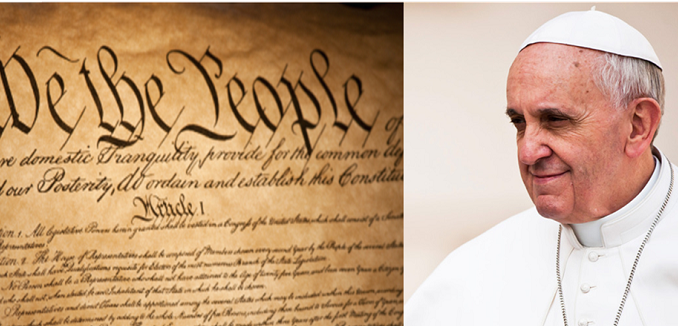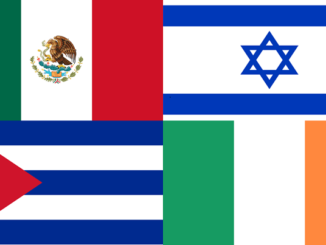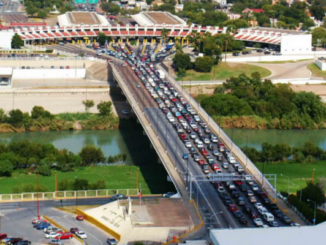
by Alex Gonzalez
The visit of Pope Francis to The U.S. has aroused some level of suspicion from some political circles about the intention of the Catholic Church in the U.S. However, any suspicions about political meddling are misplaced, or mere political attacks. The Catholic Church in the U.S. has been a strong promoter of democracy, and federal Institutionalism – the institutions of government and Constitution – that is very different from Catholicism in Latin America where the Church has traditionally played a role in resisting secular Institutionalism.
There are clear political and religious attitudes that separate American Catholics from Latin American Catholics – especially on how they perceive the institutions of government. In Latin America, the Church was responsible for indifference towards secular governments – the institutions of government – and democratic movements that did not reflect the teachings of the Church. Conversely, in the U.S., The Catholic Church played a major role in assimilating immigrants and promoting a “civic culture” that embraced the institutions of government and democracy.
Americans assume that the separation of church and state is a straight-forward issue. The government should never prohibit religious freedom, and religion should never meddle in the federal institutionalism, or the creation common civic culture, that was Thomas Jefferson’s purest form of religious freedom.
And for the most part that has been the case in the U.S., and the recent case in Kentucky about Kim Davis shows that, albeit some may strongly disagree with ruling of the Supreme Court, everyone agrees that the ruling is the Law of the Land, and thus, the ruling itself is a form of federalism, respect for the Institution ( the Supreme Court). However, in Latin America this type of separation, or respect for the Institution by Church, did not exist in a post-independence movements in the late 19th Century and throughout the 20th Century. Constitutionalism, and respect for the institutions, was never promoted by the Catholic Church, and the Church often challenged the state.
Democracy was also never openly advocated by ruling despotic elites who tended to rely on nationalistic rhetoric to spur anti-Institutionalism and anti-imperialist fervor in Latin America.
America is a nation whose political ideals were created by religious tenets for the protection of political rights and religious freedom, and the Institutions of government under the Constitution are embedded with those ideals. For example, according to John Locke, man was God’s creation whose goal is to create society. Nevertheless, man also sees man’ purpose, and rights, in creating society and government. When Thomas Jefferson wrote in the first paragraph about laws of nature and Nature’s God in the Declaration of Independence in 1776, he was clearly speaking of the “Natural Rights” that John Locke had described in the Two Treatise of Government.
However, these rights are designed more directly to create a society and government than the promotion of any religious mandate or hierarchy. Thomas Hobbes believed that man had supreme rights to whatever is necessary to protect him from pain, death, and chaos. This “right” can be transferred or renounced under some voluntary reciprocal act, a social contract. This mutual transferring of Rights, according to Hobbes, is called a “covenant,” which has its basis on God‘s own creation. Hence–man being a creature of God, and set in motion by God’s own cause (an act of reason) come together voluntary under this covenant. Yet any of man‘s acts are to be considered a cause set in motion by God, Therefore, God himself is the cause of the covenant and man’s perpetual liberty and government.
Thus, our own religious values that the Founders used to create our national character, and Institution within the Constitutions, is what makes us free people, whether as individuals or religious sect; but this freedom also requires adherence to a civic culture – adherence to the Constitution and the Institution. This civic adherence guarantees that “all” individuals and religions are “equal” under the law. And these principles of Constitutionalism have applied equally to waves of Catholics the came to the U.S. in the late 19th and early 20th centuries.
At the beginning of 20th Century, many argued that Catholicism had an innate aversion to democracy and capitalism. But in the U.S., in the 1920s, Catholic groups pushed for integration of their immigrant communities into a common civic culture, and they succeeded.
According to Samuel Huntington’s Book Who Are We, the Catholic Church used its clergy, schools, press, charity, and fraternal organizations to persuade immigrants to give up their “foreign” culture and adopt Anglo-American Protestant culture. Irish Bishops had difficulty in convincing Irish immigrants to abandon their traditions so as to conform to a more “Anglo-American protestant tradition of values and moralism.” But by the turn of the 20th century, Irish catholic schools and churches became a propagation of American values and American nationalism.
In fact, Catholics in America learned how to use Institutionalism and democratic means to fight back Protestant prejudice and protect their religious teaching. By 1840, nearly half of New York City residents were foreign born Irish Catholics, who were generally poor and desperate for an education. Thought public schools while free and open to all, were effectively, Protestant…and anti-Catholic
“Irish Catholic children…were being expected to attend schools where the King James Bible was read, where Protestant hymns were being sung, where prayers were being recited, but most importantly where textbooks and the entire slant of the teaching were very much anti-Irish and very much anti-Catholic.”
But it was Bishop John Hughes who launched a protest. Hughes proclaimed, “We are unwilling to pay taxes for the purpose of destroying our religion in the minds of our children…” These children deserved their own schools, and demanded that the New York Public School Society, the Protestant civic leaders in charge of education, make city funds available for Catholic schools. Two years later, the Protestant Public School Society was replaced by the New York City Board of Education, an elected body. John Hughes was named archbishop of New York in 1850.
Our nation, our Natural Rights, and our laws are based on Protestant individualistic ideals that are enshrined in the U.S. Constitution. And our Rights are enshrined to protect us from government and other individuals. So American Catholics in the U.S, adapted quite fine to institutionalism in America while maintaining their core religious values.
But this was not the case for Catholic in Latin America. Why did Catholics in the U.S. embrace Institutionalism while Catholics in Latin American resisted Capitalism, democracy and Institutionalism? The Elites and the Catholic Church turned religion into resistance theology against institution of government, and instead, the Church used popular anti-western nationalism.
According Francis Fukuyama:
One of the most obvious ways that development in the United States has differed from that of Latin America concerns political institutions. While Latin America is on the whole more democratic than other parts of the world democratic rule, and the deviations in the region, in terms of authoritarian government, suppression of human rights, civil conflict and violence, have frequently been severe. Democracy and rule of law are ends in themselves (see Sen 2001), and they are also obviously related to a society’s ability to achieve other objectives like economic growth, social equity, and political inclusion, and freedom of religion.
Thus, the lack of democracy and rule of law in Latin America allowed for internal fight between the elites and the Church and thus hindered economic growth and Institutionalism, which leads to more equality.
But, the less democratic and lacking of Institutionalism, the more the masses are prone to rely on religion and resist and democratic movement, and instead support a “strongman” or religious leaders. In Latin America, the Catholic Church took advantage of this lack of Institutionalism and taught Catholic theology that resisted a Constitutional federal secular government. The Catholic Social teaching involved anti-private Property Rights, anti-Capitalism, and instead focuses on social teachings in rural areas in Latin America.
This lack of a common civic culture and Intuitionalism in Latin American led to Catholic Clergy teaching their social theology as a substitute for a civic culture and it led to anti- Institutionalist cultures that were prone to revolutions and Marxism anti-westerner propaganda. As a result, the 20 Century in Latin America was plagued with nationalist revolutions. And these revolutions in Latin America were driven by a Marxism, often religious fervor, by priests who were not preaching the religious civic values – civic values argued by Hobbes or Locke that are essential to develop social cohesion and Institutionalism – but rather religious values that resisted democracy, capitalism, and secularism.
For example, In Mexico in the late 1920a, a revolt of Catholics in Mexico who called themselves Cristeros (Christian Catholics) fought the secular Mexican government were for a type of Catholicism that had more with maintaining indifference towards Institutionalism and the creation of national of government. The Cristeros in Mexico were not in favor of a secular Mexican Constitution, or a Lockead “Social Contract” that creates a Jeffersonian ideal of separation of Church and state, but rather they were fighting for religious zeal that ran counter to interest the national government.
Moreover, even after all Latin American states won their independence from Spain, the Catholic Church had a vested interest in in keeping non-workable decentralized government entities; the Church owned much of the land. When the state government got the right to seize the land, the Clergy used old ritual to fight back. As David Landes’ Book the Wealth and Poverty of Nations: Why some are Rich and Why Some Are So Poor, the new nascent independent states spent most of their political energy fighting the Church than developing cohesive government institutions.
As a result, there is civic culture in the U.S. within the Catholic Church that does not exist in Latin America.
Latin American countries deliberately modeled their political order on that of the United States in the early 20th Century. However, the civic culture and Intuitionalism were never promoted by the Church and despotic elites; Latin American elites or intellectuals never taught their citizens about John Locke, Thomas Hobbes and Rousseau, and the Rights of Men, an often books translated from English or French to Spanish had to be approved by Church.
Therefore, formal political institutions in the U.S. were deliberately designed to inhibit strong political actions and to limit the power of government, and to organized society through the Institutions. But in Latin America, many political social movements were organized by the Catholic Church to resist national identities and Institutionalism.
Under Hobbean and Lockean ideals, God gives us Rights, but those rights are conditioned by common adherence to a common civic culture that respects the institutions Constitution. Catholics in the U.S. adhere to those values because in the 20th Century, the Catholic Church changed it social agenda to help immigrants to assimilate into protestant civic ideals. The Catholic Church utilized religion to transform their alliances from Roman Catholicism to American Catholicism; alliances to the American institutions, not Rome. Catholics from Ireland, Italy, Southern and Eastern Europe were encouraged to embraced Intuitionalism as the means to archive assimilation and political power; this phenomenon never occurred in Latin America.
In Latin America, social and political conflicts have been severed and the ability of social groups to use formal political institutions to resolve, mediate, or mitigate them has been much less effective. So the root causes of political instability and weak governance in Latin American has been lack of Institutionalism, and the Catholic Church was in part responsible for it.
Alex Gonzalez is a political Analyst and Political Director for Latinos Ready To Vote. Comments to [email protected] or @AlexGonzTXCA



